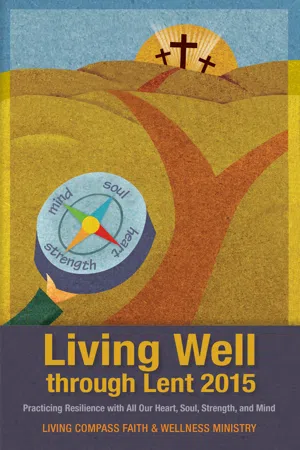![]()
Second Sunday in Lent
March 1, 2015
Mark 8:31-38
Jesus as a Model for Resilience
THE RT. REV. SCOTT HAYASHI, Bishop of Utah
During his ministry Jesus encountered many obstacles and barriers. These included the people in his hometown, his family, the leaders of the Temple, Pharisees, the Roman Authorities, and his own disciples. The wonder of Jesus was that, in spite of this, he continued his mission. At times he needed to go off alone to pray, and sometimes, because of exhaustion, he just needed to sleep—he fell asleep in the back of the boat during a storm!
In the gospel lesson for today, Peter takes Jesus aside and rebukes him! One assumes that if Jesus had allowed this to go on, all of the disciples would have joined Peter to prevent Jesus continuing forward. Jesus puts a stop to this immediately. He has a purpose to fulfill, and not even Peter, the rock upon whom Jesus would build his church, will prevent him from completing his work.
Jesus is a model of resilience. I define resilience as a person’s, object’s, or system’s capacity to keep doing what it is meant to do. I do not mean how quickly one bounces back or recovers from an injury or accident; I mean keeping on regardless of accident or injury. For instance, a car that gets into a fender bender, loses a mirror, a door, heat, windshield wiper, and the front grill can still move from point a to point b. The car may not look very good, may not be street legal, but it can still move forward as long as it has fuel and the engine runs.
Jesus, no matter what the difficulty, fared forward. I believe that he was able to do this because he was absolutely clear about what his work was, what his mission was. He also had helpers, the disciples (even if they were difficult to manage at times) and others, who provided and assisted him and with whom he had relationships. He also took time to rest, when he needed, to be replenished spiritually and physically. He knew he needed this. He was self-aware.
Jesus was resilient because of (1) clarity of purpose, (2) self-awareness of his needs, and (3) attention to relationships with God and others. Like Jesus, you and I, if we are going to be resilient, need to imitate Jesus, pattern our lives after his, and build or maintain these same three qualities and characteristics.
Monday, March 2, 2015
Weekly Resilience Practice: Clarifying Your Purpose
In yesterday’s reflection, Scott Hayashi identifies that Jesus was resilient because he had “clarity of purpose.” When our purposes align with God’s purposes, we experience ever-greater clarity, strength, and resilience. Peter is rebuked in yesterday’s gospel for focusing not on “divine things, but on human things.” Clarity of purpose does not mean that we stop focusing on human things, but that, as we focus on human things, we do so within a wider, more divine perspective.
To help you find your own clarity of purpose, take time at the end of each day this week to reflect on your day. Write down some of the “humans things” that took your attention, then think if there is a way you can view these “human things” in a divine way that puts them in a wider perspective of God’s purpose or call for you. Where are your purposes in alignment with God’s purposes, and where are they out of alignment? Reflect on what you might do about that.
Tuesday, March 3, 2015
Living Well with All Your Heart
Sunday’s reflection suggests that Jesus was able to “fare forward” because “he had helpers, the disciples...and others, who provided and assisted him and with whom he had relationships.” Support from others is key to resilience. Who helps you “fare forward?” Who helps you maintain your clarity of purpose, especially when life is challenging? How might turning to others for support and asking for help when you are uncertain of the way forward help you to be more resilient?
Wednesday, March 4, 2015
Living Well with All Your Soul
In this past Sunday’s reading from the Old Testament, we learn of the covenant God made with Abraham and Sarah. “I am God Almighty; walk before me, and be blameless. And I will make my covenant between me and you…” (Genesis 17:1, 2). Abraham and Sarah can move forward into the new life that God is calling them to because they are not walking alone; God has made a covenant with them.
Looking back on your life, when have you felt God walking with you through a time of change? Do you think of yourself as having a covenant with God, like Sarah and Abraham did? If so, what is God’s part of that covenant, and what is your part?
Thursday, March 5, 2015
Living Well with All Your Strength
In the gospel reading for this past Sunday, Jesus announces that he must face physical suffering. “Then [Jesus] began to teach [his disciples] that the Son of Man must undergo great suffering, and be rejected by the elders, the chief priests, and the scribes…” (Mark 8:31). Peter wants to say no to this and wants to prevent it, but Jesus rebukes him for this.
Are you facing any physical challenges or suffering right now? Is anyone you know suffering? What does it mean to accept and face suffering, knowing that God is with you and with the others as well? What helps you to be resilient in the face of suffering?
Friday, March 6, 2015
Living Well with All Your Mind
Earlier in the week we reflected on Jesus’ rebuke of Peter for setting his mind “not on divine things, but on human things.” Today, we invite you to reflect more deeply on what kinds of things you set your mind on. To set our mind on something means that this is what we are paying attention to. In our Living Compass wellness programs we have a saying: “Whatever we pay attention to is what will grow.” If we pay attention to our spiritual wellness, or to an important relationship, or to our physical wellness, this is what will grow.
Is there some aspect of wellness or resilience in your life that you would like to see grow? If so, how specifically might you pay more attention to that aspect of wellness or resilience in your life?
Saturday, March 7, 2015
Living Well in Thought, Word, and Deed
As you reflect back on what you have read and written this past week, what thoughts or insights stand out for you? Did you have a word or a conversation with someone—or with God—that stayed with you? Did you do something new or different this week to help you develop clarity of purpose? to develop self-awareness of your needs? to pay more attention to your relationship with God and others? Is there a particular deed or action related to these things that you want to continue?
Reflect especially on clarifying your purpose, as it is fundamental to being resilient. Is there a thought, word, or deed relating to clarifying your purpose that you wish to note and carry forward?
![]()
Third Sunday in Lent
March 8, 20...


